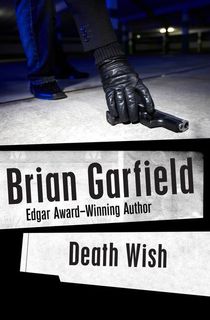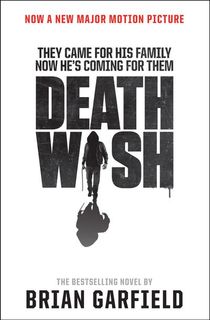Paul Benjamin’s life is turned upside down when his wife, Esther, and daughter, Carol, are attacked in their own home. Esther is left for dead, while Carol suffers from serious trauma that leaves her in a fragile mental state. Though most in his situation may wait for the criminal justice system to handle these murderers, Paul has other ideas. He decides that the only way to ensure this doesn’t happen again is to take matters into his own hands. The CPA transforms into a vigilante—killing would-be muggers before they even have the chance to strike. And once he starts spiraling into the darkness, he realizes there’s no coming back.
Is Paul's drive for revenge transforming him into a dangerous and deadly man?
Death Wish, and its sequel Death Sentence, spawned a franchise of adaptations and spin-offs six films deep—with the most recent film starring Bruce Willis hitting theaters on March 2. In the excerpt below, Paul—still grieving over his wife’s death and unsure of how to carry on—starts carrying around a sock full of quarters to use for protection. It's not long before Paul finds a reason to wield his makeshift weapon.
Read on for an excerpt of Death Wish, and then download the book.
Monday he was still deep in what he decided was post-trauma tristesse. He had taken sleeping pills last night; they made him irritable in the morning. Last night he had decided it would be best to go in to the office today—even if he didn’t get any work done it would be better to have familiar people around him—but now he knew he couldn’t face any of them.
He went to the bank because he was low on cash. It was a short walk, across the street from the newsstand on the corner of Broadway and Seventy-second. The same route he had followed yesterday to buy the Times; the same route he had followed thousands of times, to and from the subway to go to work. Yet now it was different. He slipped into the bank as if it were a hiding place.
He had thought of buying a heavy cane and carrying it as a weapon. But it would be unwieldy at best; someone with a knife could get in under it, and it might anger them if they saw you carrying an obvious club.
At the counter he stood behind a fat man in a grease-spotted apron who was buying change, probably for a lunch counter’s cash register. The man went away with a sack heavy with coins wrapped in paper rolls.
Paul bought a ten-dollar roll of quarters. Back in the apartment he slipped it into a sock, knotted it, and crashed it experimentally into his cupped palm. Then he put it in his pocket. He would carry it all the time henceforth.
He wasn’t gentle; he was a flabby coward. It was dawning on him that the most terrifying thing about his existence was his ineffectualness.
He felt like a fool. He took the roll of coins out of his pocket, untied the sock, and went to put the roll of quarters away in the drawer of an end table. The drawer opened an inch and then stuck. He jerked at it; it came out, fell from his hand, tumbled onto the rug. The oddments from it—safety pins, decks of cards—flew across the floor.
He blurted a string of oaths at the top of his lungs.
After he had put the drawer back and gathered up its droppings he re-wrapped the roll of quarters in the sock and returned it to his pocket.
[...]
He paid the tab and got off the stool and swallowed the fourth drink too fast, and felt the effect of it a moment after he hit the sidewalk. The traffic on Broadway seemed to be moving too fast for his eyes to track. He had to make an effort to walk without weaving. At the corner of Seventy-fourth Street he decided to cut across town on the side street because he didn’t want all the people on Seventy-second to see him in this condition.
He was several yards into the block before the fear hit him. There was no one in sight down the entire length of the street; the shadows were sinister and the heavily massed buildings threw dangerous projections into the street—steps, awnings, parked vans: killers could be hiding behind them, or in the narrow service alleys.…
He remembered the other night, his terror crossing the East Side in the Forties; he drew himself up. It’s about time to quit getting railroaded into panic. He walked forward with quicker steps; but his hand in his pocket closed around the sock-wrapped roll of coins and his bowels were knotted and it was no good pretending the soul-sucking darkness wasn’t alive with terrors. The beat of his heart was as loud as the echoes of his heels on the concrete.
At first he did not hear the movement behind him.
In the corner of his vision an apparitious shape. He did not stop or turn; he kept moving and kept his eyes straight ahead in the insane hope that if he pretended it wasn’t there it would go away. He was walking fast but he couldn’t betray his fear by breaking into a run. Life was suddenly all he had, and all he wanted. Maybe it was his imagination after all—maybe there was no one, only the echoes of his own steps, his own shadow moving across a stucco wall? Yet he did not look back, he could not. Half the long block yet to traverse, the street-lamp throwing a pool of light that made the shadows deeper.
“Hey, hold it, motherfucker.”
The voice like a blade against his spine.
Close enough to touch. Right there behind him.
“Hold up. Turn around, honkie.”
I’m hearing things it’s my imagination.
He stood bolt still in his tracks, shoulders tensed against awaited violence.
“Motherfuck, I said turn around.” It was quiet, tense—high-pitched, a little crack in it. An adolescent voice, a tone of raging bravado—bravado to mask fear.
Petrified. But: My God he’s as scared as I am!
And as Paul turned slowly to face his fear he heard the snap-blade knife open with a click and something inside him exploded like a brilliant deafening burst of discovery:
Anger.
A furious physical rage.
The adrenalin was shooting through him and he felt the heat exploding through his head; even as he came around and the attacker came in view Paul was lifting the roll of coins from his pocket, whipping his arm up overhead, stretching to smite this enemy the mightiest blow his inflamed muscles could deliver.…
He caught the fragmentary race of reflected lamplight along the moving blade of the knife; saw it but did not register it, all he knew was the target and the weight of the kosh swinging from his hand, swinging down toward that dark narrow weaving skull.… And he heard the enormous bellow that thundered from his own chest, the bestial cry of berserk assault.…
… And the kid with the knife was falling back in panic, dodging, arms whipping up over his head; wheeling, scrabbling, getting his balance, digging in his toes—running….
The savage downswing found no target and Paul stayed his hand before the roll of coins could smash his own knee but it made him lose his balance and he broke his fall with a palm—got one knee under him and knelt there watching the kid who wasn’t more than half his size or weight, the kid running away up the street, flitting into an alley, instantly absorbed into the city as if he hadn’t been there at all.
The street was empty and he got to his feet but it hit him then, the reaction, and he began to shake so badly he had to reach for the railing of a brown-stone’s front steps. He hung on to it and pivoted on his hands, collapsing in a circle until he was seated on the third step from the bottom. Hot flushes and chills prickled his flesh, his vision spun, and a surge of uncontainable exultation lifted his voice to a high call of joy:
“Haaaaaaaaaaaaaaaa!”
Want to keep reading? Download the book now.
This post is sponsored by Open Road Media. Thank you for supporting our partners, who make it possible for Murder & Mayhem to continue publishing the thrilling stories you love.
Featured still from Death Wish via Metro-Goldwyn-Mayer (MGM)


